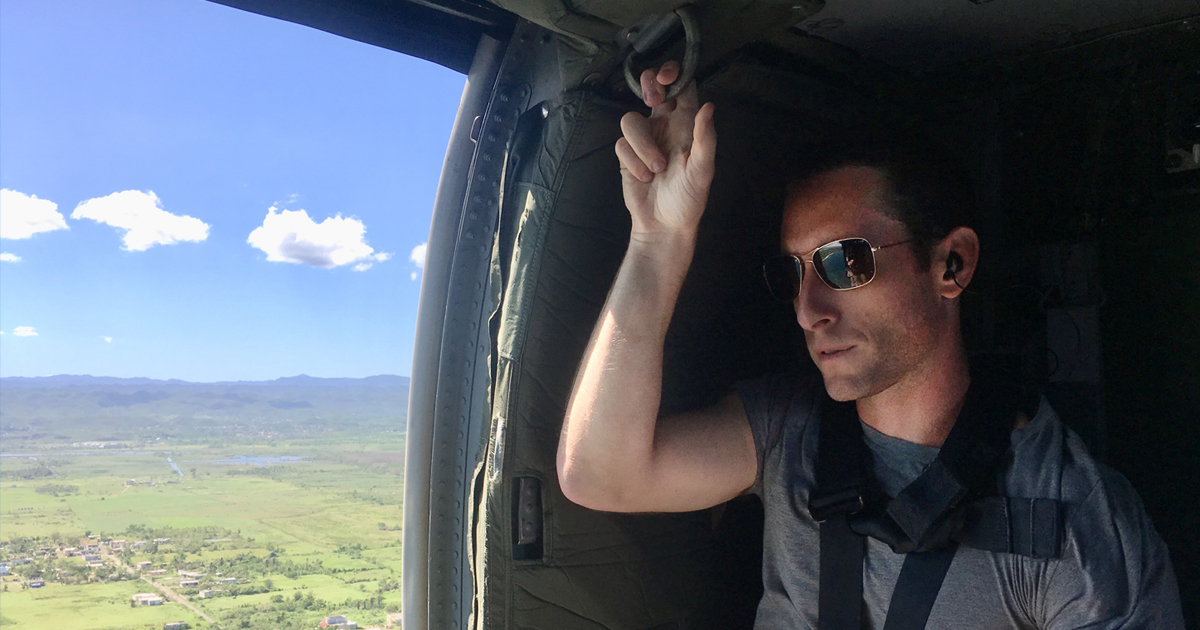How ‘Expeditionary Entrepreneurship’ Can Aid Disaster Response

Shortly after the Afghan capital of Kabul fell to the Taliban on August 15, 2021, scores of refugees, diplomats, troops, journalists, and others attempted to flee. The ensuing air evacuation was the largest in U.S. history, but thousands were left behind, stranded and desperate to get out.
“It was such an abrupt, chaotic exit,” says Jesse Levin ’08. Nearly 7,000 miles away, in Norwalk, Connecticut, the Babson College alumnus was monitoring the situation from a storefront in the SoNo Collection Mall in Norwalk, Connecticut, trying to find ways his organization could help. The 36-year-old is founder and CEO of Tactivate, which employs a concept he calls expeditionary entrepreneurship” to aid in crisis operations through volunteer humanitarian assistance, disaster response, and emergency economic stability work.
Recently, Levin found a way to marry his interests in business and disaster preparedness. Under the Tactivate banner, Levin, together with Sefra Alexandra and Danielle Roberts, co-founded The Readiness Collective, an emergency-readiness training, social club, and gear shop that resembles REI with banks of computers and a military twist. The collective offers classes such as Tequila and Tourniquets, where participants can learn “some basic but really powerful life-saving medical skills like how to control bleeding” while sipping “craft cocktails.” Other classes offer instruction on small home generators, wilderness first aid, and cultivating “the readiness mind.”
The ‘Entrepreneurial Toolset’
Levin says he has put his readiness ideas into practice in real-life disaster situations around the world. As he describes it, expeditionary entrepreneurship is about deploying small, highly specialized teams that employ the “entrepreneurship toolset from a solution-engineering approach.”
Tactiviate also has operated to aid crises in Haiti, the Philippines, Puerto Rico, and several countries in Latin America. Levin counts the group’s work in Puerto Rico, after Hurricane Maria in 2017, as one of the group’s success stories.

Jesse Levin ’08 on a mission in Puerto Rico
In the hurricane’s aftermath, food and water were readily available, but the island’s communications infrastructure was offline, meaning local stores could not process EBT (“food stamp”) cards, which roughly half of the population relies on to buy food. With stores out of commission, the local community continued to rely on “humanitarian aid drops that were plagued by logistical challenges,” according to Levin.
Levin says that federal agencies acknowledged the problem but “were unable to move quickly enough.” So, Tactivate organized a team of experts and came up with a solution: installing mobile satellite terminals that would connect stores across the island and bring them back online. Tactivate often has an initial out-of-pocket cost—in this case, $33,000—that Levin says they try to recoup later. He says over $3 million in food and water transactions have run through the systems they put in place across the island.
The goal of “bringing an entrepreneurial capacity into a disaster zone,” Levin says, is to boost the local private sector by identifying challenges and addressing them. He contends that external humanitarian aid can hinder more than it helps, because local communities begin to rely on it rather than mobilizing their own resources and capabilities, which are important for long-term sustainability.
Readiness as a “Discipline in Practice”
In Afghanistan, Tactivate assisted with what became a “citizen-led evacuation.” The U.S. Department of State normally leads evacuations, sometimes in collaboration with the U.S. Department of Defense (if the military is involved). But the U.S. withdrawal “was so abrupt,” Levin says, and Afghanistan descended into chaos so quickly, that citizen groups stepped in to bolster government efforts.
Groups like the Truman Center, a membership organization of former and current national security experts, helped procure charter flights and funding, says Malcolm Phelan, a staff member there. Then they tapped people like Levin, who had turned the Readiness Collective into an ad-hoc operations center, to shepherd evacuees through the chaos and onto a plane. One of Levin’s contacts on the ground in Kabul “might have a couple trucks,” he says. “They might know someone with a GIS map or an aircraft. There might be a Marine stationed at the Abbey Gate [to the airport ] who knows the latest password.”
Phelan says Levin and Tactivate helped roughly 20 families get safely out of Afghanistan.
Though overseas missions will remain the core of what he does, Levin says his ultimate goal, through Tactivate and the Readiness Collective, is to develop a “paradigm of readiness” that moves people away from the “fear-based, zombie-apocalypse” approach to disaster preparedness and positions it as more of “a discipline in practice—like exercise and diet.”



